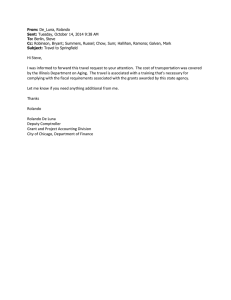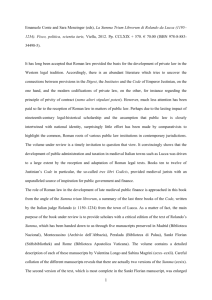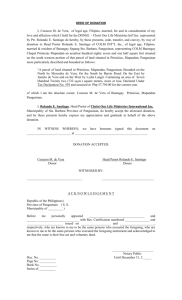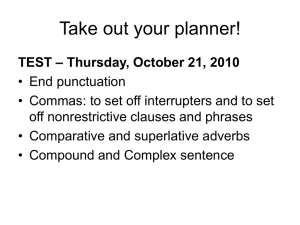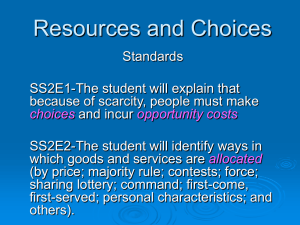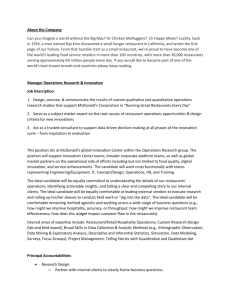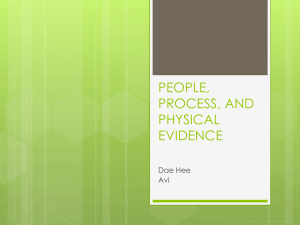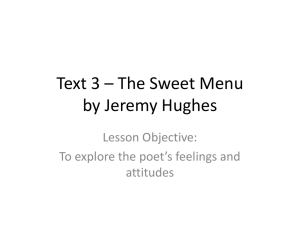Jo Anne Behling <jo - Author DR Ransdell
advertisement
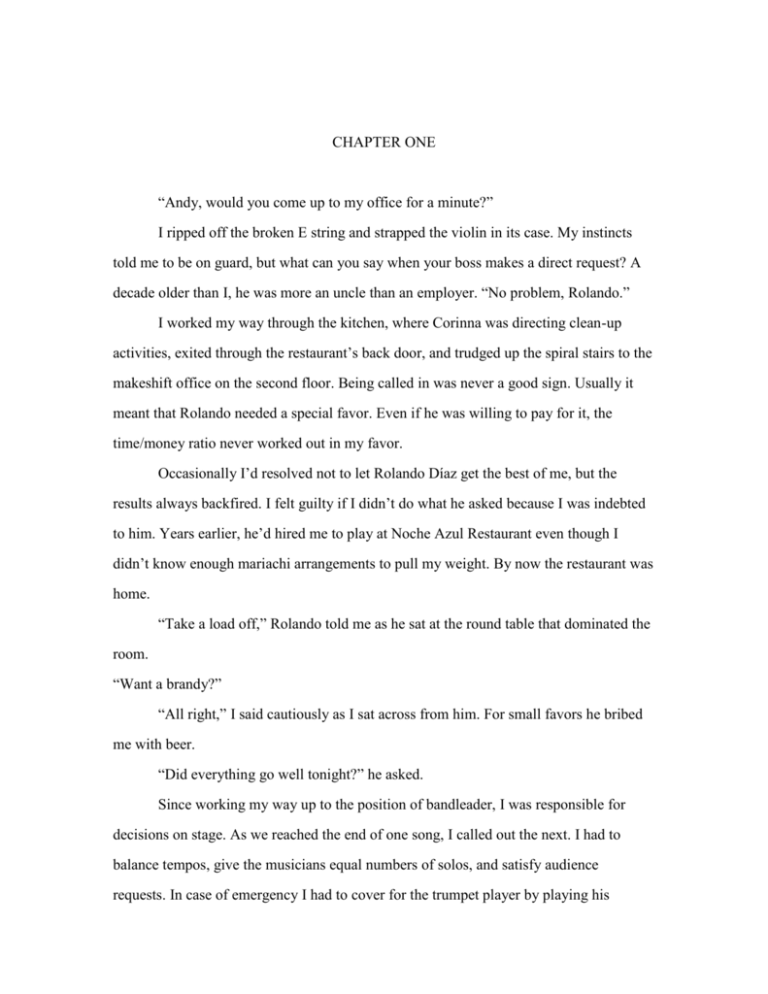
CHAPTER ONE “Andy, would you come up to my office for a minute?” I ripped off the broken E string and strapped the violin in its case. My instincts told me to be on guard, but what can you say when your boss makes a direct request? A decade older than I, he was more an uncle than an employer. “No problem, Rolando.” I worked my way through the kitchen, where Corinna was directing clean-up activities, exited through the restaurant’s back door, and trudged up the spiral stairs to the makeshift office on the second floor. Being called in was never a good sign. Usually it meant that Rolando needed a special favor. Even if he was willing to pay for it, the time/money ratio never worked out in my favor. Occasionally I’d resolved not to let Rolando Díaz get the best of me, but the results always backfired. I felt guilty if I didn’t do what he asked because I was indebted to him. Years earlier, he’d hired me to play at Noche Azul Restaurant even though I didn’t know enough mariachi arrangements to pull my weight. By now the restaurant was home. “Take a load off,” Rolando told me as he sat at the round table that dominated the room. “Want a brandy?” “All right,” I said cautiously as I sat across from him. For small favors he bribed me with beer. “Did everything go well tonight?” he asked. Since working my way up to the position of bandleader, I was responsible for decisions on stage. As we reached the end of one song, I called out the next. I had to balance tempos, give the musicians equal numbers of solos, and satisfy audience requests. In case of emergency I had to cover for the trumpet player by playing his melody lines on the violin or cover for a rhythm player by picking up the guitar. I liked the work and was good at it, but by the end of the night, the decision-making wore me out. “Things went fine until that drunk insisted on singing with us,” I said. Volunteer singers were a common nuisance. We didn’t mind the granddaughter belting out a favorite tune to her grandparents or the husband surprising his wife with a ballad, but when an audience member approached the stage Tecate in hand, we knew we were in trouble. “He wasn’t so bad,” Rolando said. This was not true. The balding crooner with the straw cowboy hat had started off beat and never found his way on. He mangled intonation as if it were a matter of style. As an extra embarrassment, after we beat him through “El moro de Cumpas,” a corrido about a famous horse race, he insisted on slaughtering “Pelea de gallos,” a huapango about a chicken fight. “The crowd loved him,” Rolando continued. “His friends loved him. Everyone else whipped out cell phones so they wouldn’t have to listen.” “Lighten up, Andy. You take everything too seriously.” “He forgot the last verse of ‘El oro de Cumpas.’” “Everybody knows which horse won the race. Big deal.” “I’m trying to save our audience from bad music.” “Hardly anyone noticed.” “I know, I know.” I always told myself not to be too critical, but then I didn’t listen. I tipped my glass towards Rolando in a drunk’s salute. “You didn’t call me up here to ask about tonight’s performance.” “You’re right, Andy. You’ve always been perceptive.” I didn’t reply. I could tell he was buttering me up, so I rehearsed excuses in my mind: “I can’t help you after hours because I’m expecting a call from my brother,” “I can’t open the restaurant for you tomorrow afternoon because I promised to help my elderly next-door neighbor,” or, best of all, “I can’t run errands for you because I promised to take my two nieces to the beach.” Rolando drained his shot and poured another. “I need to ask you a favor. I want you to keep an eye on my wife.” The metal sundials on my traje jingled as I lost my balance and nearly fell from the chair. Yiolanda strutted through Noche Azul in such skintight clothing that I was afraid she might stop breathing. Every night I kept an eye on her even though I promised myself not to. So many men fell at her feet that I didn’t want to get trampled in the crowd. “Why can’t you keep an eye on her yourself?” I asked. “I have to pop down to Mexico.” “At the height of the tourist season?” Rolando rarely left Squid Bay to travel forty minutes north to L.A., let alone to go anywhere else. He wasn’t opposed to vacation, but the restaurant business was competitive, and he was always worried that another mariachi restaurant would get the edge. Each evening he patrolled the restaurant from the moment it opened, greeting customers or milling around. If need be, Rolando might be chopping onions in the kitchen or patting the backs of coughing customers who’d swallowed more hot sauce than they could handle. In between he would run back and forth to the cash register to handle tabs. “Yiolanda can run the restaurant,” he continued. “I’ve got to attend my sister’s granddaughter’s baptism in San Carlos. You’re looking at the godfather.” “Can’t it wait?” “She’s my only grandniece. I can’t refuse.” I took off my moño, a kind of floppy bow tie, and loosened my top shirt buttons. Squid Bay had broken a record that afternoon with a high of ninety-six. Since we’d barely hit July, the temperature signaled a miserable summer. We’d sweat all evening on stage even though we hadn’t worn our jackets. My boss rubbed his rough chin, which was evidence of a hurried shave. “You must think I’m stupid to have married a much younger woman.” “She’s not that young.” “When you’re fifty, a thirty-five-year-old is a teenager. Wait a dozen years. You’ll see what I mean. And then there are her moods. Who knows what goes through that head of hers? One day she snaps at me and the next day she’s cooing. If you ever find a woman who has only one mood, marry her.” He ran his fingers through salt and pepper hair. “This is God’s way of punishing success.” “It’s not your fault you fell for her.” Yiolanda was the perfect fantasy because she didn’t work at flirting. It came as naturally as walking did to regular people. Once she got your attention, her pale eyes bored into you, egging you on. The feeling was always worse in the summer. On sweaty nights, she wore nothing under her dress. “Anyway,” I continued, “why me?” “You’ve worked for me longer than the others.” This I could blame on selective memory. I was merely the first musician Rolando had hired himself, the others having been hired by his father. Instead I was the musician Rolando had logged more drinking hours with. Before he’d married, we used to drink Coronas all night with the staff as soon as the other customers left. Sometimes we didn’t leave Noche Azul until dawn. Rolando rotated his shot glass without picking it up. “I know you can be discreet. Also, you live close by.” This much was true. I lived a brisk, seven-minute walk from the restaurant. I knew the timing exactly because I always cut it too close. “When are you leaving?” “Tomorrow morning.” “Should I stay and help Yiolanda lock up after we close the restaurant?” “No. Post yourself near the back door and see if anyone is waiting for her at the end of the night.” “Should I watch for anything else?” Rolando smiled so briefly I barely detected it. “I’m not sure.” * * * The empty street spread below me like a cloak. I focused on the broken tiles on the roof of St. Michael’s, the walls protecting its yard, and the sidewalks where children woke me with the sound of their tricycles on lazy afternoons. My neighbors were asleep, but the Circle-K catty-corner to my building was open 24/7. The fellow who ran it was standing outside, chatting with the owner of Hotel Osborn, which was next door. Evidently the hotel still had vacancies. By three a.m., I would have given up. My fifth-floor balcony stretched the length of my bedroom. Between two weather-beaten chairs, a cracked wooden box doubled as a table. Opposite the chairs, a metal rack designed for flowerpots hung from the railing. Since I’d already killed half a dozen tomato plants and an equal number of philodendrons, I’d filled the rack with magazines and a bottle of brandy. Sometimes I had a shot when I got home, but tonight it was too hot. For the past three years, I’d refrained from telling Rolando that his wife was cheating on him. I’d never considered that he would be better off knowing. Probably he did know. Even though we talked about everything else, we never discussed Yiolanda. The trumpet player and I had spotted Yiolanda around Squid Bay with various men. Lately I’d seen her leaving the Osborn with Marco Antonio Gutiérrez, the out-oftune third violin player from Las Cometas. A tall, graying man who supposedly owned enough real estate that he didn’t need a regular day job, Marco Antonio claimed that he played in a mariachi because he loved his heritage and because music gave him luck with women. He was a poor violinist but a reasonable singer, gregarious enough to interact with an audience. More importantly, he was the financial backing of Las Cometas, so they weren’t about to get rid of him. He’d produced both their albums even though the first one had lost money and I imagined a similar fate awaited the sequel. Although I hadn’t been watching for them, I’d seen Marco Antonio leave the Osborn with Yiolanda three times in the last month. Each time they’d been surrounded by noontime traffic, but Yiolanda always stood out in a crowd. I’d considered ways to broach the subject with Rolando, but I hadn’t come up with a plan. Sweat dripped off my forehead and fell onto the balcony with a splat. This was the second day of the heat wave. During daylight hours, thanks to occasional breezes and frequent trips to the beach, I tolerated my non-air-conditioned apartment without complaint. At night I felt cornered because the morning promised another scorching day. For a moment I almost thought my brother Joey was right--get a regular job, move to the burbs, and rent an apartment with decent air conditioning. Then I wouldn’t have to associate summer nights with uncomfortable heat and uncomfortable heat with Yiolanda. For now I was as stuck as Rolando was. He didn’t want to be a godfather, and I sure as hell didn’t want to keep an eye on his wife.
